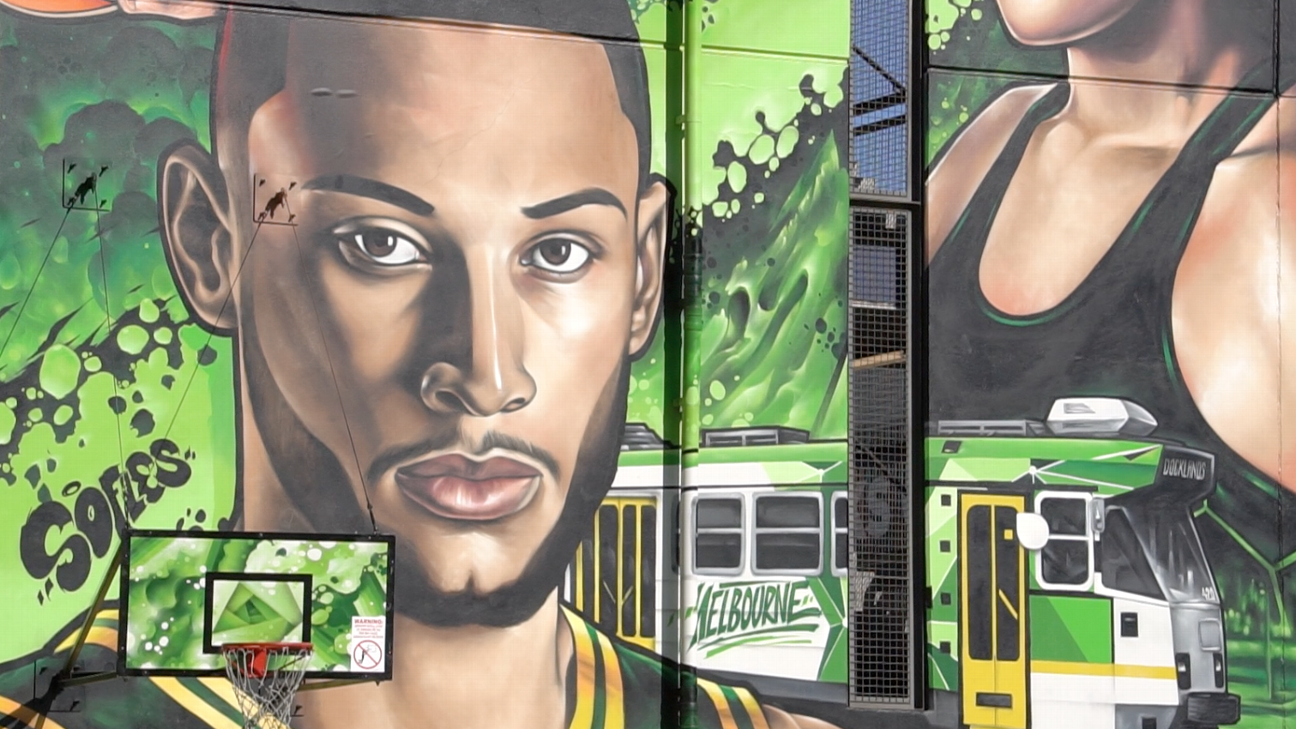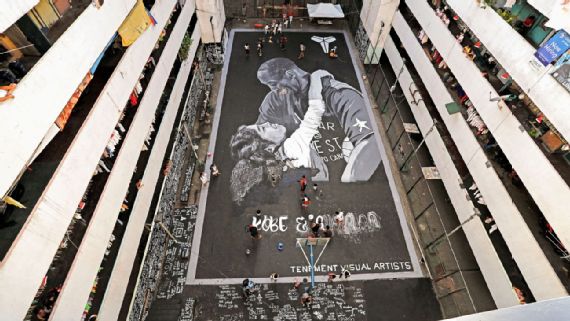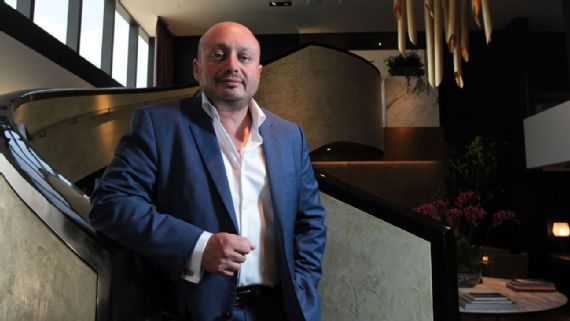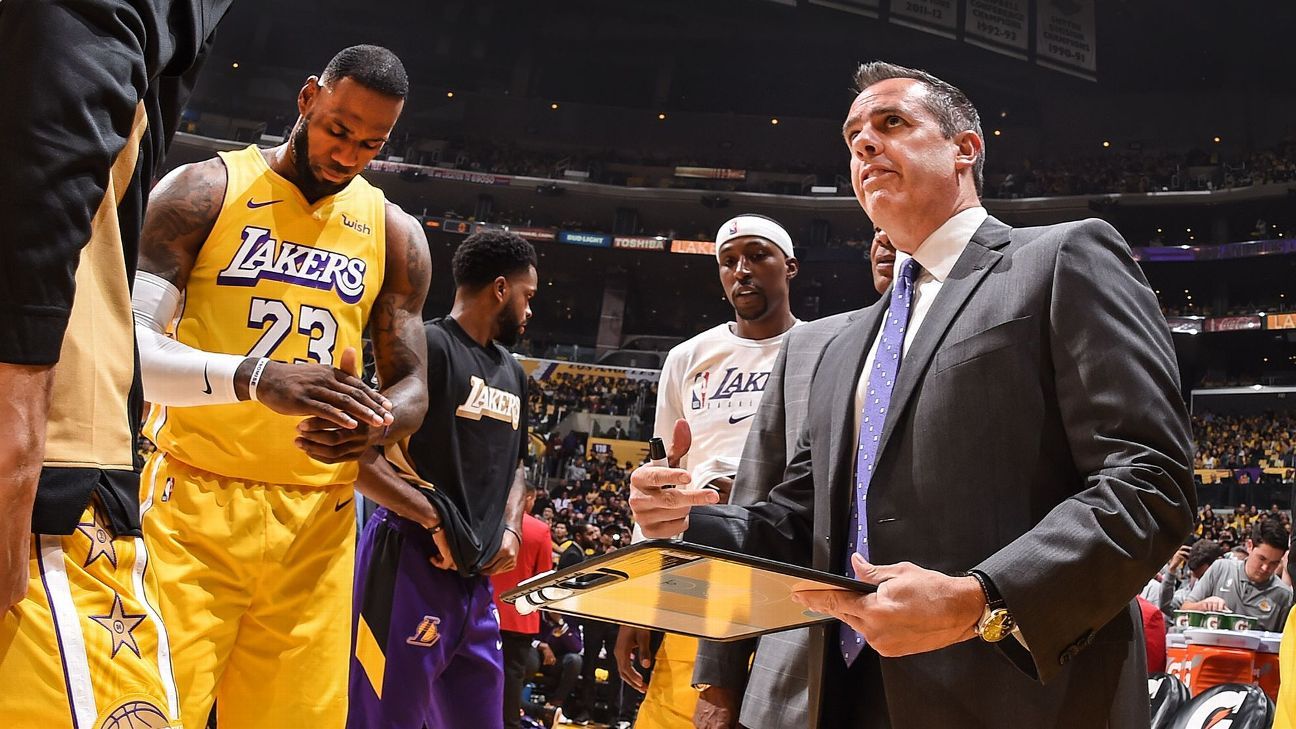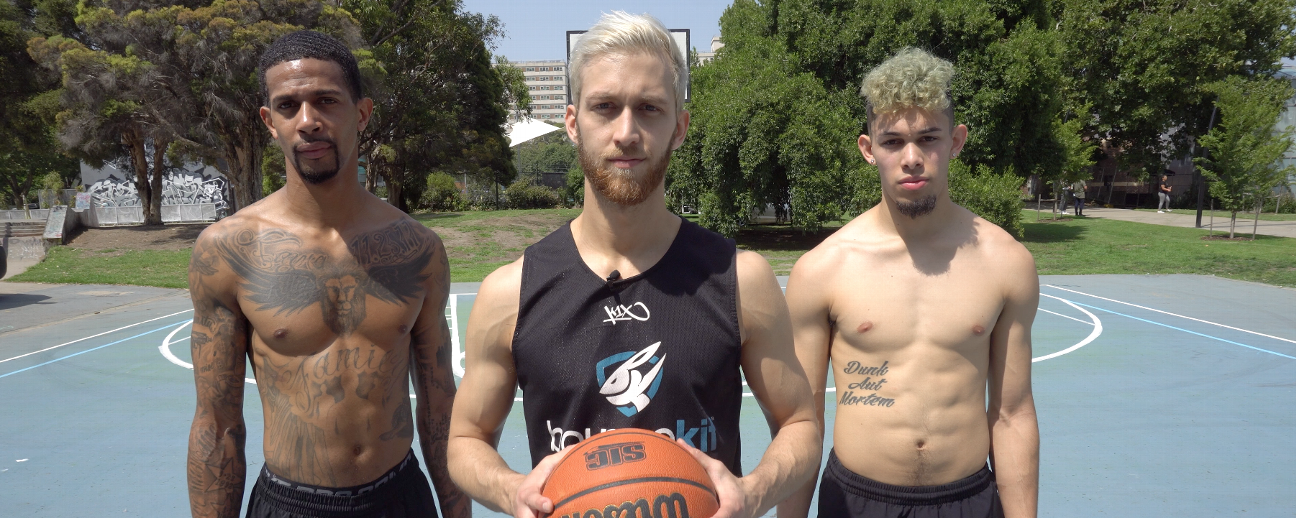
The life of a professional dunker
Meet Guy Dupuy, Jordan Kilganon and Isaiah Rivera; three of the world's best slam-dunkers who make a living by traveling the world, stuffing basketballs into hoops.
For many young kids who grow up with a basketball glued to their hands and a hoop nailed to the weatherboards above the family garage, the dream is simple; practice, practice some more, eventually get drafted into the NBA, win a championship (or two) and retire in your mid-30s with not only fame but an enviable bank balance.
Somewhere along the way you might get married. You might have children. You might switch teams. You might even decide to venture off into another area of business when your ageing body inevitably starts to scream 'no more.'
But not every basketball-adoring child grows up with ambitions of playing in the NBA Finals. Heck, some aren't even interested in having NBA commissioner Adam Silver call their name out on draft night.
Welcome to the wonderful world of professional dunking - a breed of acrobatic basketball stars who are honing and perfecting one craft: the slam dunk.
You know those guys who perform the high-octane, trampoline shows during NBA halftimes? Well that's what Guy Dupuy, Isaiah Rivera and Jordan Kilganon are doing each and every day. Oh, but without the trampolines.
A cheeky smirk flashes across Dupuy's face when asked whether or not he had enough talent to play in the NBA. Judging by his facial expression, there's no doubt what his response will be.
"Definitely," he confirms. "If I would have gone from high school to college, I would have definitely made the NBA."
So why not pursue it? Why give up on it if you've already checked the talent box?
"I was 11 years into basketball but I wanted something more fun and with less discipline," Dupuy explains. "So when I was 15, I did the French All-Star game, and I won the dunk contest. The dunks were so crazy. They had 15,000 people there and I actually broke the noise-meter. It all started then and there. The hype got crazy. Now it's a profession, it's fun all of the time and you don't have the pressure and weight on your shoulders."
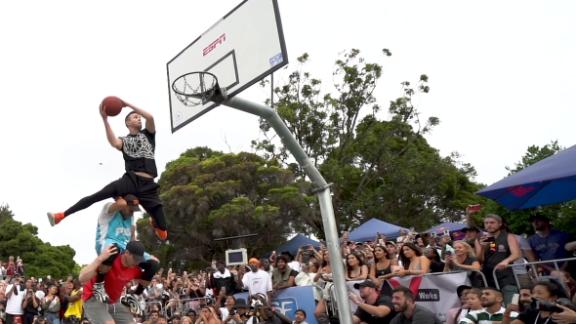
Meet three of the world's best slam-dunkers who make a living by travelling the world and sinking hoops.
Dupuy, now 32, is a professional dunker. In fact, you could take that a step further and say he is the ultimate professional dunker. Born and raised in Paris, Dupuy gave up on the NBA dream in his teens and has forged a career out of perfecting the art of a slam dunk. It's a world many aren't familiar with but one which is growing at a rapid rate.
Instead of taking to an NBA arena every second night, Dupuy travels the globe competing in dunk tournaments and contests, hypnotizing thousands of fans with his unique skill set. It's been his life for 12 years.
"I will go on tour and often come home for eight hours, unpack, repack and then get back on the plane again. I've been around the world 11 times. There's no rest," Dupuy tells ESPN while in Melbourne for the 2020 Prahran Summer Jam: Australia's largest organised annual dunking event. "It's even harder than being a professional basketball player because as a dunker you've got to entertain, put on a show and win the whole thing."
Dupuy's athletic prowess is mind-boggling.
Literally minutes before we sit down to chat, he strips his shirt off, exposes his ripped core, and leaps over three people to stuff a basketball into a hoop while simultaneously cracking, and attempting to sip, a can of beer.
In the 15 minutes which followed at chic Prahran Park, he must have dunked the ball 20 times. Each jam he throws down is vastly different from the last. Each boasting its own unique style and flair. It's what we now see in the NBA.
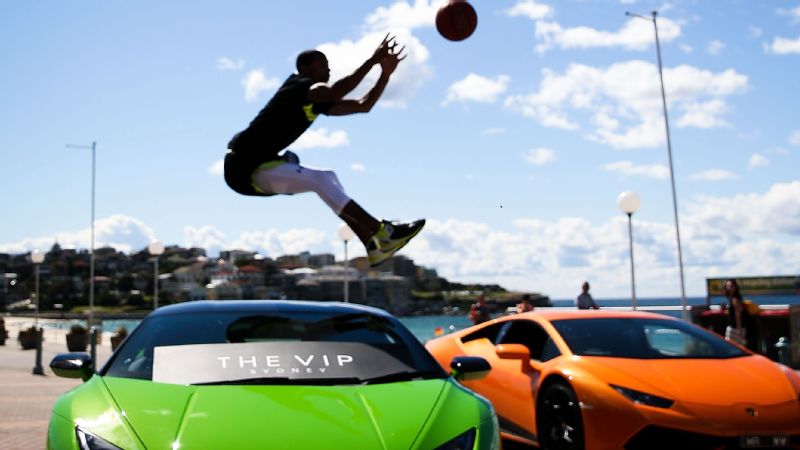
Professional dunker Guy Dupuy shows off his athletic ability, leaping over a car while catching and throwing a basketball during his trip to Sydney, Australia. GETTY IMAGES
"I've had Michael Jordan come and watch me dunk. Vince Carter, John Wall and Zach LaVine," Dupuy says, as casual as ever. "When Zach LaVine and Aaron Gordon won their dunk contests, they were thanking me for giving them ideas and telling them how to dunk. I helped them with dunks that had never been done in the NBA. All those dunks are all me."
In addition to teaching tricks to those competing in the world's top basketball league, Dupuy has been a pioneer for professional dunkers. He has essentially paved the way for dozens more to follow in his footsteps and make a career out of elevating and stuffing a ball into a hoop. You could certainly say he inspired a generation.
In the summer of 2013, Rivera answered perhaps the most daunting question any teenager eventually has to face: what is it you want to do when you grow up?
"From the time I put down my first dunk I just knew I wanted to do it every single day," a nostalgic Rivera says under the shaded oak trees of Prahran Park. "One day, when I was 15, I just started training to try and dunk. I began looking up workouts and then every single day [I was] trying to touch the rim.
"At 16, I found the community of dunking. I started finding out about guys like Guy and I was like, 'whoa, I really want to do this'. After that, my goal was to be the best dunker in the world."
Born in Puerto Rico, Rivera moved to the United States as a toddler and it wasn't long until he became "obsessed" with basketball. It didn't matter whether he was at school or basketball practice, dunking, something he considers to be "the most spectacular thing in sports," was always on his mind.
"I loved it so much, it was an obsession. It was almost like an addiction," he explains. "I would have basketball practices for two or three hours and I couldn't wait for it to be done so I could go home and just dunk outside my house for hours. Literally until it got dark."
Professional dunkers and close friends Guy Dupuy and Isaiah Rivera talk to ESPN while in Melbourne, Australia for the 2020 Prahran Summer Jam. Jamie Van Leeuwen/ESPN
Now 22, Rivera is taking the dunking community by storm. Like Dupuy, he frequently travels the world competing in dunk contests and tournaments. One week he'll be in Australia, the next it's China, the next it's France.
However, unlike Dupuy, Rivera's rise has come off the back of social media, where he has amassed a cult following of over 125,000 followers on Instagram and 28,000 subscribers on his YouTube channel.
For athletes like Rivera, social media has been a game-changer. It has offered them a platform to showcase their skills to a whole new audience, as well as the ability to interact with their growing fan bases.
"Social media is everything. It's key for dunking, because that's how people find you," Rivera says. "When I first started, I treated Instagram as my personal training journal. I posted videos saying how I feel and what my goals are and it allowed me to track my progress. People really relate to that stuff because they feel like they know you personally.
"Dunking is a community. There's a lot of people out there trying to dunk, whether you're going between the legs or just barely getting it up there. To be able to share your passion with other people is everything. Without social media I would definitely still be dunking, whether I would be making a living off it is a different story."
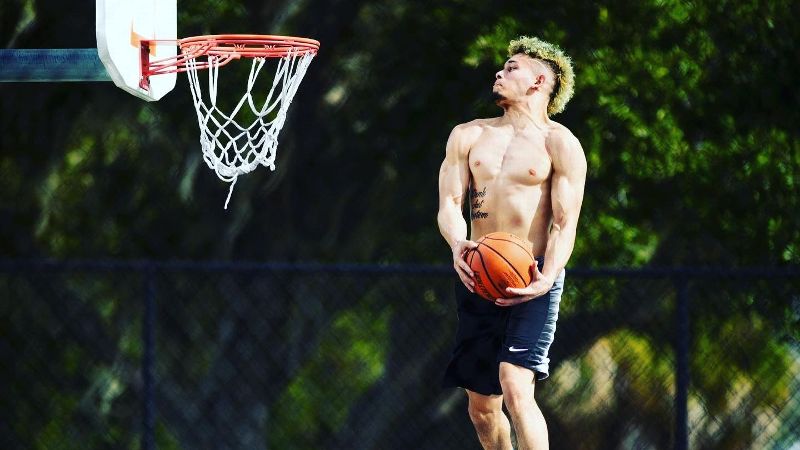
Professional dunker Isaiah Rivera takes off for one of his famous dunks during a practice session. ISAIAH RIVERA
Just like Dupuy, Rivera seems to have springs hidden in the soles of his sneakers. One minute he's casually dribbling a basketball between his legs at half court, sharing a laugh with those around him, the next he's hanging upside down from the rim. How on earth did he get up there?
It certainly doesn't take a professional dunking judge to spot his talent and it's no surprise he won the famed Quai 54 contest in Paris last year, a feat which led to many labelling him the new undisputed dunk king of the world.
"If I go too long without dunking my mood starts getting, um, bad," he jokes as his hands grip a ball and his eyes dart towards the nearest basketball hoop. In the blink of an eye, he's gone.
Kilganon sees himself as an artist. A sculpter, if you will. It's his passion for creativity and self expression which gets him out of bed every morning and fuels his day.
But instead of painting a canvas or writing music, Kilganon's preferred art form just happens to be dunking basketballs.
"The reason I love it so much is because I can get really creative with it," he tells me, as Dupuy and Rivera begin to have their own mini dunk contest in front of us. "There's so much that hasn't been done and to me it feels like every time I do a new dunk it's like I've discovered something new, something that nobody else has done before.
"I've already discovered 130-something new dunks and to me, that's the coolest feeling ever. I absolutely love it."
Named after NBA legend Michael Jordan, Kilganon grew up in a basketball-mad household in Sudbury, a town 150 miles north of Toronto, Canada. Before he could even crawl, his parents had surrounded him with dozens of rubber balls and a plastic Fisher-Price hoop.
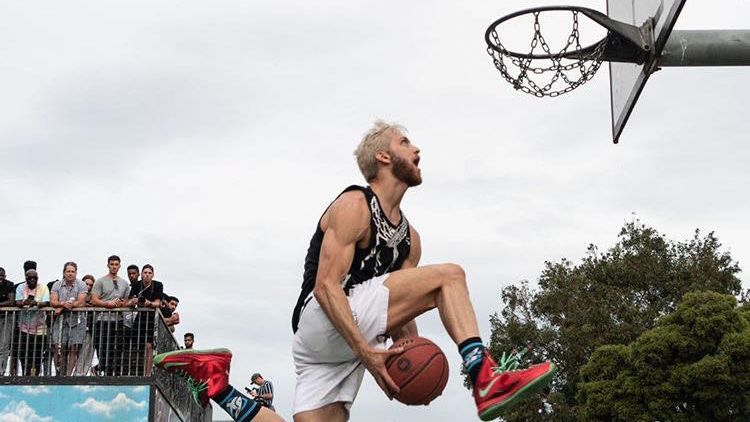
Jordan Kilganon goes up for a trademark 'under the leg' dunk during the 2020 Prahran Summer Jam in Melbourne, Australia. Joshua Scott
By the time he was a teenager, Kilganon was playing every sport imaginable. From basketball to volleyball, baseball to track and field events; you name it, he competed in it.
"I was dunking every day on eight or nine foot hoops and when I finished high school I just went all in on it. I quit every other sport and started from there," he says. "I eventually got to a point where I felt like I could be a professional dunker. I felt like I was better than some of them out there."
Before he could legally take a sip of alcohol in the United States, Kilganon had recorded a vertical leap of 50 inches. For context, LaVine is the only current NBA player with a vertical leap higher than 44 inches.
Watching the height and hang-time Kilganon gets simply defies gravity. It defies belief. After stretching just about every muscle in his body, a process which takes almost half an hour, he picks up a basketball and prepares to go to work.
It's not long before he's flying through the air towards the hoop and passer-byers are rubbernecking their way down the footpath of Malvern Road.
It's incredible how effortless he makes it look. With a full run-up, and the biggest leap of my life, I manage to just graze the underside of the rim. Just. Meanwhile, off a couple of casual steps, Kilganon jams and swings on the rim for good measure. Believe it or not, we're the same height - 6'1".
Dupuy may have gotten his dunking break through an invite to the French All-Star game and Rivera mainly through social media, but Kilganon was forced to take a slightly different path to the top.
"I had been sending my mixtape out everywhere and finally one person saw it and decided to fly me out to Los Angeles," he recalls. "It was supposed to be to film for two weeks, but two weeks turned into six months and from there, that's where I started dunking against professionals."
At age 23, Kilganon was invited to attend the 2016 NBA All-Star game where he pulled off an incredible scorpion dunk to leave the Air Canada Centre, now Scotiabank Arena, speechless. To this day it's one of the most remarkable televised dunks ever seen.
The rest, as they say, is history. Just like Dupuy and Rivera, Kilganon can now call himself a professional dunker.
Stuffing a ball into a hoop almost feels like a fantasy profession. For basketball fanatics, it just seems too good to be true.
"I feel like I don't really have a job, because I'd be doing this regardless," Kilganon says, almost pinching himself. "Can you even call it a job?"
He's not wrong. Guys like Kilganon, Dupuy and Rivera are obsessed with dunking, but fortunately for them it's something which is paying the bills. After all, Dupuy believes "if you're going to call yourself a professional, you have to be able to feed your family and put a roof over their heads."
So how exactly do they get paid?
"Somebody from a dunk contest will contact you and they will offer you an appearance fee to compete. If you win there's more money on top of that," Rivera explains. "Depending on what contest it is, if you win you could get anything from US$500 to US$5,000. But they will fly us out, put us up in a hotel and give us a per diem. Everything is paid for, we don't spend a dime.
Professional dunker Guy Dupuy poses for a photo in front of the Sydney Harbour Bridge during his first trip to Australia in 2017. Getty Images
"How many events you get invited to depends on how good you are and how big your following is. Your traditional dunking season is in the summertime, so from May until November I was doing events pretty constantly. December is the chill out time for dunking. In order to make a living out of it you need to be at the top, but it can be done."
Of course, there's no guarantee anyone will consistently rake in the big bucks from winning every competition. Plus, the high risk of injury for dunkers, which if sustained would effectively leave them out of work -- as unlike a professional basketball player nobody continues to pay their salary whilst they rehab -- means supplementing an income is a necessity.
A few years ago, Dupuy launched his own inspirational streetwear brand, aptly named No Rest For Greatness. It started as a way for him to earn extra cash on the side but it's grown into a company which promotes his message about hard work and the quest for perfection. He's also managing the next brigade of up-and-coming dunkers.
Meanwhile, Rivera and Kilganon are both involved in training programs which share dunking secrets with those aspiring to follow their footsteps into professional dunking.
Both guys are also instructors at The Dunk Camp, which runs each year in June and teaches participants how to improve their vertical leap. A place in the camp would set someone back between US$750-$1,250.
Another way these dunkers are making money is through social media product promotion, a new-age marketing craze which has taken off in recent years.
"Social media comes in handy again because you'll get people contacting you and making you do a dunk with a product, or something like that," Rivera says. "Often it's for Instagram or YouTube, but it's another avenue for making money through dunking."
It's easy to fall into the trap of thinking professional dunkers just show up to a hoop, lace their sneakers and simply start jamming.
The truth is, it's treated as a professional sport and countless hours of work go on behind the scenes to perfect each and every dunk.
Just as Steph Curry spends hours practicing his three-point shot and Tiger Woods his drive off the tee, guys like Dupuy, Rivera and Kilganon do the very same with their dunking. No dunk which goes viral on social media or causes an eruption at an NBA game comes together overnight.
"When I'm not at a contest, I'm training," Dupuy explains. "I'll go into the gym twice per day, both times would be for a three-hour session. It's a lot of time and a lot of dunking. There really are no days off."
It's much of the same for Rivera who splits his time between the weight room and honing his dunking technique.
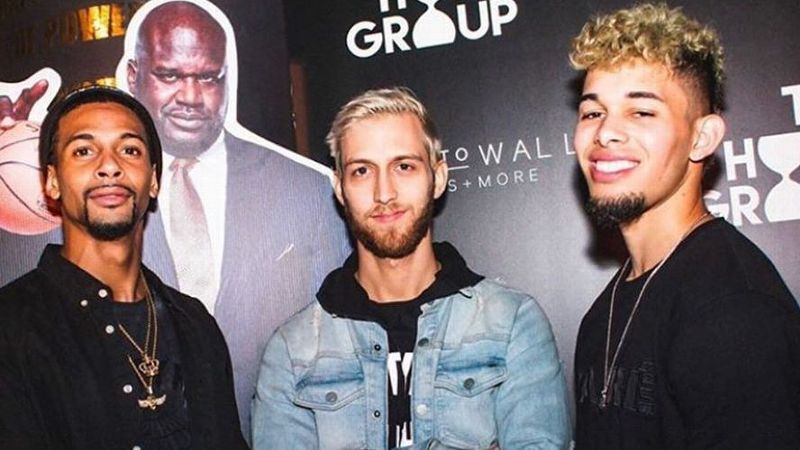
Professional dunkers Guy Dupuy, Jordan Kilganon and Isaiah Rivera in Melbourne, Australia for the 2020 Prahran Summer Jam. Joshua Scott
"I have a low rim which I use," Rivera says as he makes a dunking motion with his hands. "The reason I have it low is because I can practice my hand speed without having to jump, because jumping takes a big toll on your body.
"After a certain point your hands start getting calluses. I just fight through the pain and [eventually] your hands start toughening up. You get used to it."
The world of dunking is one which many aren't familiar with but it's one which continues to grow and thrive. It's certainly not an easy career but Dupuy, Rivera and Kilganon are living proof that it can be a legitimate profession. They wouldn't change it for anything.
"It's so great that dunking can now be seen as a profession and a sport," says Dupuy. "If you believe in yourself, put the work in and put yourself in a position to get a shot, you can do anything."

Jake Michaels is a Melbourne-based sports writer who covers everything from Aussie Rules to Formula One, basketball to boxing. He joined ESPN in June, 2013 and works as an Associate Editor, covering a wide range of sport in Australia and around the world.
